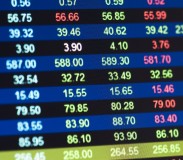
The Future of Stocks

The stock market comprises of publicly-owned companies that are bought, sold, and traded in shares. It may also be referred to as the equity market or the stock exchange. In the United States, the stock market is one of the most essential parts of the economy. It gives publicly-held companies the opportunity to access funds that will allow them to grow their business, while those who invest become owners of the company. They may choose to cash in their shares at any given time. Read on to find out the history of the stock market and some predictions for the future.
History
The idea of trading shares in a company is not a new one. One of the first modern stock exchanges was established in London, England in 1773. Nineteen years later, the New York Stock Exchange (NYSE) was formed. Although it wasn’t the first stock exchange in the United States, it quickly grew into the most influential. Located on Wall Street, the NYSE became a financial hub for traders around the world. With very little competition in North America, the NYSE was a force to be reckoned with. Although the NYSE has been hit by everything from depressions to recessions and even bombings, it has shown resilience over the years, bouncing back after setbacks. Today, although there are a growing number of stock exchanges around the world, many major international companies choose to list their shares in New York.
Predictions
Purported financial experts go to great lengths to try to predict the growth of the stock market during any given year. Past growth is explained using complex theories and explanations. While the stock market itself isn’t going anywhere soon, it’s difficult to predict how the market will fare over the long term. Ask a psychic or ask a financial advisor and you’re likely to have equal chances of cashing in. The current bull market – one where prices are rising and buying is encouraged – won’t last forever. The other side of the coin is a bear market, one where prices are dropping and investors are more likely to sell their stocks before prices hit rock bottom. When everyone is selling at the same time, it’s bad news for the stock market.
Pros and Cons
 Stocks have the capacity to provide bigger returns than the majority of other investments. With that said, returns are never certain. Investing in stocks comes with risks. Investors try to follow trends which can be difficult to predict – even the slightest misstep by the company can lead to plunging stock prices. If you’re investing, the goal is to purchase a stock as the company is gaining popularity. That way, stocks are still inexpensive and the opportunity to cash in is greater. However, it’s a hard move to orchestrate. You have to be able to foresee the companies that will be popular in the future. If you or your financial advisor’s predictions aren’t correct, the effect can be disastrous.
Stocks have the capacity to provide bigger returns than the majority of other investments. With that said, returns are never certain. Investing in stocks comes with risks. Investors try to follow trends which can be difficult to predict – even the slightest misstep by the company can lead to plunging stock prices. If you’re investing, the goal is to purchase a stock as the company is gaining popularity. That way, stocks are still inexpensive and the opportunity to cash in is greater. However, it’s a hard move to orchestrate. You have to be able to foresee the companies that will be popular in the future. If you or your financial advisor’s predictions aren’t correct, the effect can be disastrous.
Quick Wrap-Up
The stock market has been around for a long time. A bear market is one in which prices are falling and investors are selling. A bull market is a growing market; stock prices are rising and investors are buying. In the future, the stock market will remain a mainstay of the United States economy.







